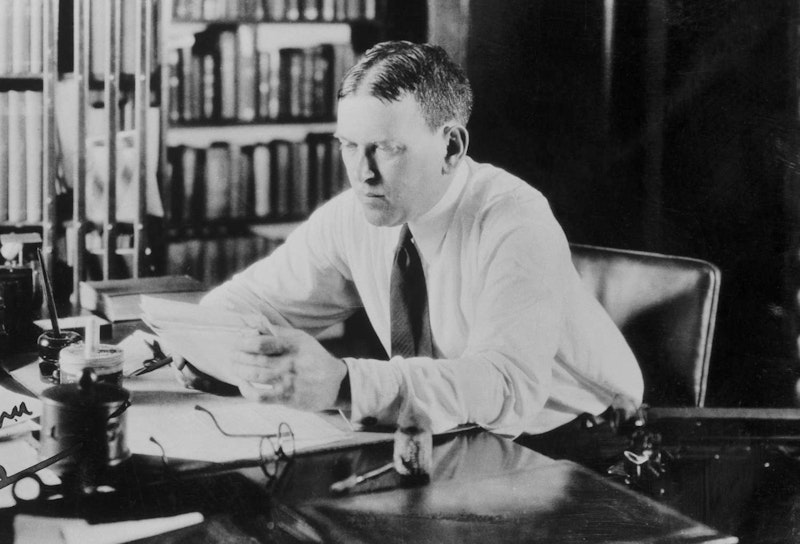It was the worst experience I’ve had as a journalist. Maybe the worst experience I’ve had as an employee of any company. I also signed a 27-page contract at the time, initialing every page. It includes a non-disclosure agreement, so I can’t directly say who I’m talking about. I can only say that the man who begged me to work for him and then, after I produced great ideas and drove huge traffic, fired me because I have too much imagination, should be eating mashed potatoes in a home.
2024 is the year to get out of journalism. The mainstream press has gone woke, which makes for very boring copy. The conservatives hire through nepotism and the buddy system and produce dull journalists. It’s all angry politics, wokeness, and celebrity stalking. There’s no real freedom. There’s no great coverage of the arts that’s the result of years of study and experience. It’s all hackery. A media crisis? It’s a catastrophe.
100 years ago, in January 1924, H.L. Mencken launched a new magazine—The American Mercury. Mencken historian Charles Mott described the Mercury: “It made an impressive appearance as a whacking big octavo in double-column Garamond-set page sheet bound in green covers. It was clearly planned for the more thoughtful reader of a free thinking sort who had fifty cents to spend on a magazine in those inflationary years. For such a reader the contents of the new review were both intellectually exciting and to the last page entertaining.” They reviewed the best books and artists and challenged the prevailing social mores, all with a great sense of fun. The writing was, is, astonishingly alive.
What media product today is “intellectually exciting and to the last page entertaining”? The Bulwark? National Review? The Nation?
I recently re-read some classic Mencken, including his famous obituary of William Jennings Bryan. It was published in the Mercury in 1925 and is still fantastic: “Bryan was a vulgar and common man, a cad undiluted. He was ignorant, bigoted, self-seeking, blatant and dishonest… He seemed only a poor clod like those around him, deluded by a childish theology, full of an almost pathological hatred of all learning, all human dignity, all beauty, all fine and noble things. He was a peasant come home to the dung-pile. Imagine a gentleman, and you have imagined everything that he was not.”
One hundred years after being written, and four decades after I first read those words as a college student in the 1980s, Mencken still remains more real, hilarious and bracing than anything I’ve read in the media in years.
And that brings me to the awful experience I had with the terrible editor—my worst experience in media, the reason why 2024 is the time to bail. My experience was at a venerable media property, one that was publishing during Mencken’s time. A couple of years ago they were doing a relaunch and wanted me. I’d come aboard as long as I could write what I wanted. I could cover skateboarding, comics, war, video games, fashion, religion, novels, surfing, science and movies. I couldn’t be restricted. I needed to be free. I initially turned them down. When I said no, the editor, a man in his 70s, called me at night to beg me to sign up, “We’re launching and I need you,” he said. I was skeptical. This guy was extremely conservative, which is great in politics but lethal if you’re trying to run an interesting newspaper or magazine. He was obsessed with the minutiae of politics. I made it very clear I wasn’t like that. I am a lifelong Washingtonian but would rather have a root canal than be some paper’s “Man in Washington.” I said plainly: “I’ll write about Christian surfers before I go to Capitol Hill to smell Sheldon Whitehouse’s farts.”
I can soar for you guys, I said. Just don’t put me in a cage.
He agreed. So I did it. I wrote about skateboarding, Batman, baseball, the war in Ukraine. I drove traffic, so much so that I was praised for it in an editorial meeting.
It was too much freedom for people to handle—especially journalists. The editor, the same man who recruited me, and who praised my ideas and ability to drive traffic, called again. He wanted to meet. We got together at a small deli near Georgetown University. He had to let me go. Never mind my ideas, or that my copy required very little editing. Forget the promise he had made. Forget H.L. Mencken. Forget the real life going on all around us.
“What we really need,” he said, “is for someone to be our Man in Washington.”

